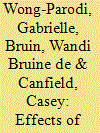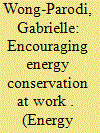| Srl | Item |
| 1 |
ID:
125825


|
|
|
|
|
| Publication |
2013.
|
| Summary/Abstract |
Critics have speculated that the limited success of energy conservation programs among low-income consumers may partly be due to recipients having insufficient literacy to understand the outreach materials. Indeed, we found outreach materials for low-income consumers to require relatively high levels of reading comprehension. We therefore improved the Flesch-Kincaid readability statistics for two outreach brochures, by using shorter words and shorter sentences to describe their content. We examined the effect of that simplification on low-income consumers' responses. Participants from low-income communities in the greater Pittsburgh area, who varied in literacy, were randomly assigned to either original communications about energy conservation programs or our simplified versions. Our findings suggest that lowering readability statistics successfully simplified only the more straightforward brochure in our set of two, likely because its content lent itself better to simplification. Findings for this brochure showed that simplification improved understanding of its content among both low-literacy and high-literacy recipients, without adversely affecting their evaluation of the materials, or their intention to enroll in the advertised programs. We discuss strategies for improving communication materials that aim to reach out to low-income populations.
|
|
|
|
|
|
|
|
|
|
|
|
|
|
|
|
| 2 |
ID:
168300


|
|
|
|
|
| Summary/Abstract |
The financial cost of personal energy consumption is substantial at the organizational level. Rarely do incentives for saving energy for the individual employee and organization align, making conservation a challenge. Here we perform a 12-week field experiment piloting two behavioral strategies: (1) social norms feedback and (2) awareness of energy monitoring, to encourage savings among 46 administrative staff at a university who were given the impression of participating in an energy quality study to reduce self-selection bias. Those in the social norms feedback condition used significantly less energy during the intervention (10% less energy) and follow up monitoring (11% less energy) phases compared to their baseline consumption. Moreover, these participants demonstrated that they learned more about their energy use than did those in the awareness monitoring condition. For policy makers and building mangers interested in the effectiveness of behavioral nudges in inducing energy savings, social norms feedback appears to be an effective energy savings nudge in an organizational setting where there are neither financial savings at-stake nor intrinsic motivation to conserve.
|
|
|
|
|
|
|
|
|
|
|
|
|
|
|
|